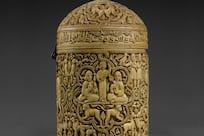AMMAN // When Urweh Zreiqat, a TV presenter, asked a group of university students to define honour in one of his talk shows, most said it was related to ethics, honesty, dignity, reputation and loyalty. None of them mentioned a woman's hymen, or her perceived fidelity, two of the biggest causes of so-called honour killings in Jordan. That, however, remains one of the leading drivers of murder in the country.
Although the crime rate is low in Jordan - the country logged about 2.6 murders per 100,000 citizens last year - one-quarter of those are crimes against women committed in the name of honour, said Hani Jahshan, a forensic pathologist consultant. Last week, a 16-year-old boy stabbed his 23-year-old sister to death after she disappeared for a month with her boyfriend, the seventh such killing this year.
Honour killings are not a new phenomenon in Jordan, a conservative kingdom whose laws are lenient to men convicted of such crimes, handing down sentences of as little as six months if they are found to have committed an act "in a fit of fury". Parliament has twice refused to reform the penal code despite pressure from human rights groups. "The so-called crimes of honour are still happening because of the mindset which needs to be changed. And that will take a very long time," said Rula Quawas, the director of the Women's Studies Centre at the University of Jordan.
"The perception is that women are the custodian of the family's honour, the repository of honour, so they are minimised and are objectified and sexualised." Last year, 17 women were killed in the name of honour in Jordan. The issue of honour is so central that some men have been known to drag their new brides to a forensic centre on their wedding night, believing they cannot be a virgin if they do not bleed the first time they have sex. But Dr Jashan said that 28 per cent of women do not bleed on their first time. Jordan law states that "he who discovers his wife, or one of his female ascendants or descendants or sisters with another in an unlawful bed and he kills, wounds or injures one or both of them, benefits from a reduction of penalty".
Rana Husseini, a female activist and a reporter with the Jordan Times, who spoken out on honour killings, said these crimes happen out of mere suspicion and rumours of an illicit relationship, rather than hard fact. A study by the United Nations' Development Fund for Women found that 25 per cent of the victims of honour crimes had lost their lives merely because they were suspected of involvement in an illicit relationship, while only 15 per cent were killed after adultery was proved.
"Others occur because the victims become pregnant out of wedlock, or are reported missing from home or simply because they marry the man of their choice against their family's wishes," Ms Husseini said. "Others are killed for financial or for inheritance reasons." Ayat, 20, was beaten by her family before one of her brothers drowned her in the Dead Sea in May this year because her husband accused her of a dalliance with another man before her marriage.
According to his confession in court, Ayat's brother said that before he forced his sister's head underwater, she had asked him what he wanted to do to her. "I want to kill you," he said. Local media reported him as confessing to police that he killed his sister to cleanse the family's honour. The same month, a 22-year-old-man shot his pregnant younger sister in the head, also allegedly to restore the family's honour.
The killings provoked a lot of anger in Jordan and Mr Zreiqat's talk show tried to address the issue. The university students watched a 10-minute drama about a father who kills his daughter because he suspected she was involved in a relation with a young man, without verifying the facts. Most of the students sympathised with the young woman. "The reason that this happened was due to the lack of dialogue between the father and his daughter, who did not give her a chance to explain herself," said one of the students.
"The problem with our society that males can do whatever they want and nobody talks to them," she said. The Jordanian National Forum for Women - a non-governmental organisation set up in 1995 - asked parliament two months ago to tighten penalties for men found guilty of honour killings and to abolish article 340 of the penal code law, which reduces the penalty for a man who kills a female member of his family found to have committed adultery. The parliament has so far refused to change the laws.
Mahmoud Kharabsheh, a member of parliament, said the media was misreporting the cases and that there were no honour killings or crimes against women. "The crimes that are taking place are related to adultery ? which has a negative impact on society. This campaign against women is exaggerated," he said. @Email:smaayeh@thenational.ae




